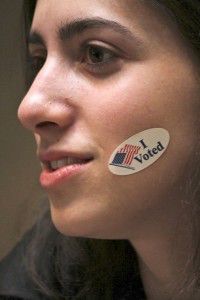
Teenagers in Massachusetts may be able to run to the ballot box the day they turn 18 if a bill allowing citizens to pre-register to vote passes through the State House.
The bill would allow teenagers to pre-register to vote the day they turn 16, giving them the option to vote in any election as soon as they turn 18.
“When you register people at 16 or 17 years old, they become more engaged in the process and to what is going on around them politically,” said Massachusetts Sen. Sal DiDomenico, of Everett, who sponsored the bill. “They will be more motivated to vote if they’re already registered.”
Legislators hope pre-registering teenagers will lead to increased participation among young adults in the 18- to 24-age bracket, DiDomenico said.
Only 48.5 percent of citizens 18 to 24 years old voted in the 2008 presidential elections, according to the Center for Information & Research on Civic Learning and Engagement.
In the 2010 midterm election, 24 percent of eligible citizens 18 to 24 years old voted, according to the same research.
“We need to make sure that people know that voting is important and part of our identity as a democratic country,” DiDomenico said.
One of the main reasons youth participation is low, he said, is because young people are just not thinking about voting – registration slips their minds.
DiDomenico said 20,000 teenagers in Massachusetts would benefit from this change immediately, with many more in the future.
“When they turn 18, they will get information, letters, flyers, and phone calls off the bat, which means they will vote in the first election they are able to,” he said, “which will in turn get them into the habit of voting.”
Since the registration and voting age is 18, many do not think of registering on their birthdays and do not vote right away, DiDomenico said.
Massachusetts Rep. Timothy Madden, of Nantucket, a co-sponsor of the bill, agreed.
“I’m sure a flood of students won’t register right away, but I see the extra two years as giving ample time to be solicited to be registered to vote,” he said.
This would be very sensible, said Kay Schlozman, a political science professor at Boston College.
Teens would be able to register at the Department of Motor Vehicles when they get their licenses or in their high schools, instead of forgetting about it when they go off to college, she said.
“Younger people tend to be more mobile,” she said. “Registering in different places can be difficult.”
If young people could register before they leave for college, they will be more likely to vote in the next election because they are not questioning how to register in different states, DiDomenico said.
Madden said he hopes to couple this bill with increased civics education in high school to improve civic participation.
“Anything we can do to get young people engaged is great,” Madden said. “We want people to express their right to get them motivated for the democratic process, involved and educated.”
Boston University students said they agree this bill would be a great idea to improve voter participation.
“If younger people voted, it would make a big difference – especially here, where a huge demographic of the youth are liberal,” said BU School of Management junior Vishaal Reddy.
One reason many young adults do not vote is that they think their vote does not matter, Reddy said.
High school students are probably more excited about finally turning 18 and being able to vote than college students are, said College of Arts and Sciences sophomore Jackie Robichaud.
“This bill might help college students become more politically active if they are already registered,” Robichaud said.
Registering while still at home would be a lot simpler, said CAS freshman Shanice Smith.
“I’m not registered just because I haven’t gotten around to it,” Smith said. “I wasn’t made aware or reminded of how or where to register.”
CAS junior Brittany Schwartz said the hardest part of voting is not the actual registration.
“It’s hard to be informed, engaged and actually go to vote,” she said.
It’s easy to feel disconnected from the real world living on a campus, Schwartz said.
“You’re living in a bubble – the campus becomes your life,” she said.
Though DiDomenico and Madden both said their main goal with this bill is to improve civic participation,
Schlozman said many times when legislators pass electoral reform bills, it is because of partisan reasons.
“Politicians are concerned that if there is a high youth turn out,” Schlozman said, “it will be very liberal.”




















































































































